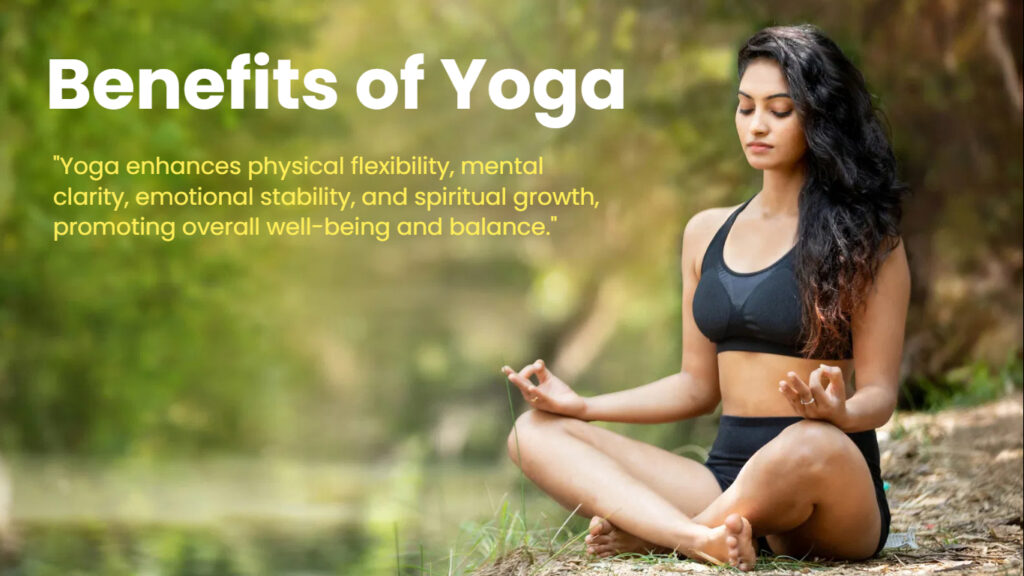I. Introduction
Yoga has deep roots in ancient Indian philosophy and is more than mere exercise—it is a holistic practice that has been cultivated for thousands of years. The Sanskrit word “yoga” translates to “to unite” or “to join,” referring to the integration of mind, body, and spirit that yoga aims to foster. In our hurried modern world plagued by stress and disease, yoga offers refuge by promoting balance and well-being on multiple levels. This article will explore yoga’s varied gifts, examining how it bolsters physical health, clarifies the mind, stabilizes emotions, and cultivates spirituality.
Download Yoga Guide
II. Physical Benefits
Improved Suppleness
One of the earliest rewards of yoga is improved flexibility. Many newcomers start to become more pliable over time, seeing notable increases in range of motion. Postures like downward-facing dog, forward folds, and pigeon pose gently stretch the muscles, tendons, and ligaments day after day. This enhanced suppleness can relieve stiffness, prevent injury, and facilitate freer movement, making everyday actions smoother and more effortless.
Augmented Strength
Yoga is also superb for developing strength. Unlike weight training focusing on isolating body parts, yoga fortifies the whole form simultaneously. Poses such as plank, warrior, and chair work multiple muscle teams at once, cultivating functional power applicable to daily living. Building strength through yoga not only hones muscle tone but also supports the skeletal structure, decreasing risks of osteoporosis and other age-related bone conditions.
Better Posture
In our modern, busy lives with long hours sitting, poor posture has become widespread, leading to aches in the back, strain in the neck, and other musculoskeletal issues. Yoga emphasizes awareness of body alignment, encouraging proper structure. Many yoga poses strengthen the core, which supports the spine, improving posture gradually. For instance, mountain pose teaches standing tall with shoulders relaxed, a lesson transferable to everyday life.
Steadier Stance
Stability is another key advantage of yoga. As the years pass, balance declines, bringing falls and injuries. Poses such as tree, warrior three, and half-moon challenge and boost balance by strengthening stabilizing leg and core muscles. Enhanced balance enhances athletic performance and contributes to general steadiness and coordination, lowering the danger of tumbles.
Deeper Breathing
Breath is central to yoga, with methods like pranayama focusing specifically on inhaling and exhaling. Through deep controlled breathing, yoga increases lung capacity, better oxygenates blood, and tones respiratory muscles. This amplified breathing function can lead to endurance gains, lower stress levels, and more energy. It also aids those with conditions like asthma teaching techniques to manage air intake and reduce symptoms.
III. Mental Health Advantages
Relief from Pressure
One of yoga’s most renowned benefits is its capacity to relieve pressure. In a world where nonstop stress is common, yoga provides a natural and effective way to calm mind and unwind body. The blend of physical motions, regulated breathing, and meditation stimulates the parasympathetic nervous system, responsible for the body’s “rest and digest” mode. This helps decrease cortisol levels, alleviate anxiety, and promote a feeling of tranquility and wellness.
Anxiety and Depression Management
Yoga has been found to be an effective approach for managing anxiety and depression. This practice promotes mindfulness, allowing individuals to focus completely on the present moment rather than worrying about the uncertain future or dwelling on regrets from the past. Specific poses like forward folds and inversions are known to calm the nervous system through their effects, while consistent yoga practice has been connected to raised levels of GABA, a neurotransmitter linked to reduced feelings of unease. In addition, the sense of community and social support discovered in yoga classes can further help in managing anxiety and depression.
Focus and Cognitive Abilities
The mindfulness and concentration necessary for yoga can enhance cognitive functions such as focus, memory, and problem-solving abilities. Holding postures and maintaining balance requires mental discipline, skills that can translate to improved concentration in other aspects of life. What’s more, yoga’s emphasis on breath control and meditation trains the mind to stay composed and focused, particularly advantageous in high-pressure situations.
Promoting Mindfulness and Self-Awareness
Mindfulness, or being completely present, is fundamental to yoga. Through aware movement, breathing focus, and meditation, yoga educates people to better understand thoughts, emotions, and bodily sensations. This heightened self-awareness can lead to deeper self-knowledge, improved decision making, and a more purposeful lifestyle. The mindfulness developed through yoga also helps manage stress, enhance relationships, and raise overall life satisfaction.
Emotional Stability
Yoga’s capacity to control the anxious framework additionally increases to passionate guidelines. Consistent practice adjusts the sympathetic and parasympathetic sensory systems, limiting enthusiastic reactivity and advancing enthusiastic strength. This implies that practitioners are better ready to handle pressures without turning out to be overwhelmed or responsive. The enthusiastic adjust acquired through yoga can bring about more consistent connections, improved work execution, and an more prominent feeling of inward harmony.
Expanded Self-Regard
Yoga urges self-sympathy and self-acknowledgment, which can altogether lift self-esteem. Not at all like numerous structures of activity that emphasize rivalry and actual appearance, yoga advances an inward center and the comprehension that the hone is an individual excursion. This breeds a feeling of accomplishment and self-worth that isn’t connected to outer validation. As people advance in their hone, they regularly encounter a developing feeling of certainty and self-power, which stretches out into different regions of life.
Expanded Emotional Consciousness
Yoga shows practitioners to turn out to be increasingly mindful of their feelings, recognizing them without judgment. This passionate mindfulness can bring about more prominent enthusiastic insight, permitting people to comprehend and oversee their feelings all the more productively. By making space between incitement and reaction, yoga assists people with reacting to circumstances with more prominent lucidity and quiet, instead of responding impulsively. This expanded passionate mindfulness can enhance connections, lessen clash, and upgrade general enthusiastic personal satisfaction.
Advances Positive Thinking
The hypothesis of yoga supports positive reasoning and a standpoint of gratefulness and compassion. Through hones, for example, contemplation, confirmations, and reflection, yoga assists with moving negative idea examples and cultivate a more positive outlook on life. This positive mind-set can bring about improved mental prosperity, expanded resilience, and a more idealistic methodology to difficulties.
V. Spiritual Advantages
Connection with Inner Self
Yoga is far more than just the physical postures one assumes; it is a spiritual path that inspires self-reflection and looking inward. By meditating and being mindful, yoga helps people connect with their inner selves, leading to a deeper understanding of their true nature and life’s purpose. Finding the inner self can result in greater clarity, a feeling of intention, and an existence with more significance.
Spiritual Progression and Enlightenment
For those walking a spiritual road, yoga provides a framework for spiritual progression and enlightenment. The practice of yoga cultivates virtues like compassion, humility, and detachment, which are crucial for spiritual evolution. The principles of yoga, such as yamas (ethical guidelines) and niyamas (self-discipline practices), offer a moral compass for living honorably and with objective. With consistent practice over time, one may experience spiritual awakening and a profounder bond with the divine or universal consciousness.
Enhanced Bond Between Mind and Body
Yoga highlights the unity of mind, body, and spirit, helping practitioners build deep awareness of how these parts of their being interconnect. Through mindful motion and breath awareness, yoga improves the bond between mind and body, allowing people to tune into the physical sensations, thoughts, and emotions that arise during practice. This heightened awareness fosters a sense of wholeness and integration, which can lead to a more balanced and harmonious life.
Online Yoga Teaching Certification
VI. Health and Well-Being Rewards
Improved Heart Health
Yoga provides ample cardiovascular advantages, despite typically being viewed as non-aerobic exercise. Certain dynamic styles, such as Vinyasa and Power Yoga, involve continuous flowing movements elevating heart rate and improving endurance. Additionally, yoga’s stress-reducing effects can lower blood pressure, reduce inflammation, and decrease disease risk by relaxing the mind. Its emphasis on controlled breathing also enhances respiratory function, further supporting heart health through this inner work.
The digestive system also reaps rewards from yoga by stimulating organs and improving circulation. Postures like twists, folds, and gentle inversions massage the abdomen, enhancing digestion and relieving bloating, constipation, and indigestion. Moreover, yoga’s anxiety-alleviating abilities can help reduce stress-related digestive issues such as irritable bowel syndrome.
Regular practice has likewise been revealed to bolster the immune system, making the body more resilient to illness and infection. Yoga’s physical movements help flush toxins, boost flow, and promote lymph movement crucial for wellness. In addition, decreased cortisol from stress relief supports immunity. Air exercises and meditation further strengthen respiratory and nerve health, fortifying the defenses.
Aids in Weight Management
Yoga can be an effective tool for weight management. While it may not burn as many calories as high-intensity cardio exercises, yoga promotes weight loss by reducing stress, improving mindfulness, and encouraging healthier eating habits. Stress is a common contributor to weight gain and stress eating. Moreover, the deep breathing and movements of yoga enhances body awareness, helping practitioners tune into their hunger cues and make more mindful food choices. Certain advanced yoga styles, such as Vinyasa or Power Yoga, also provide an intense full-body workout, burning calories and aiding in weight loss through sweat-inducing poses that challenge both flexibility and strength.
Community Building and Reduced Feelings of Isolation
Yoga classes and communities create a sense of belonging and connection. Practicing yoga with others fosters a shared experience, providing social support and motivation for attendees. Many people find lifelong friends and supportive networks through their yoga practice, which can enhance overall well-being and reduce loneliness. Participating in yoga classes or workshops encourages social interaction, particularly for those who feel isolated or have limited social connections in their lives. The communal aspect of yoga helps build relationships and create a sense of community that welcomes all.
Promoting Compassion, Empathy and Kindness
Yoga philosophy emphasizes cultivating compassion for oneself and others through mindfulness, empathy and kindness. These values are often reinforced through group classes, where students encourage each other’s growth with mutual respect and support. By internalizing these qualities in practice, individuals are more likely to extend them in their interactions outside the studio, improving relationships and contributing to a more compassionate society.
VIII. Conclusion
Yoga provides a diverse range of advantages that transcend physical fitness, encompassing mental, emotional, spiritual, and social wellness. Its holistic method to well-being makes it a strong instrument for boosting overall quality of life. Whether you are striving to advance suppleness, mitigate stress, foster mindfulness, or intensify your spiritual practice, yoga offers a thorough and accessible path to accomplishing these aims. Blending yoga into your daily schedule can result in enduring good modifications in all dimensions of your existence. Additionally, a dedicated yoga practice can cultivate profound peace both on and off the mat. Some benefit greatly from yoga’s computationally complex flows and challenging balances, while others prefer short soothing sequences to ease distressing thoughts. No single way exists to reap yoga’s rewards – exploring various styles acclimates body and soul.


